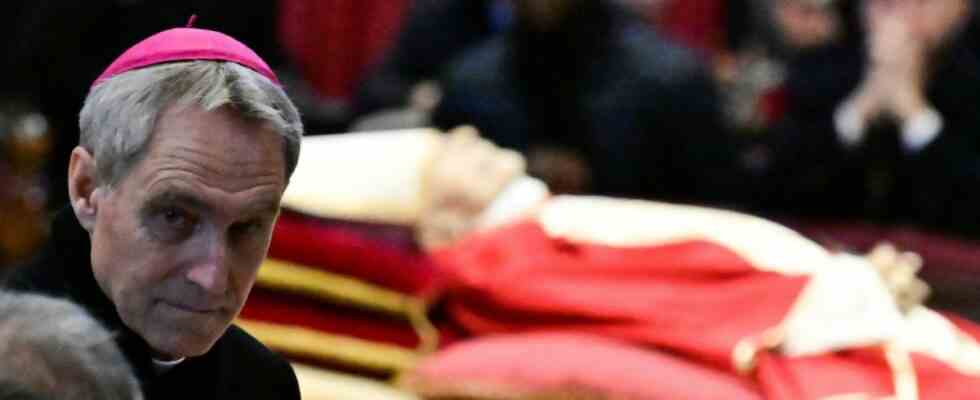Georg Gänswein has been Joseph Ratzinger’s personal assistant since 2002. In an interview with Vatican Radio, Archbishop Gänswein spoke about the death of Benedict XVI.
Gänswein flew to his family in Germany on December 27, Benedikt was still fine there. In the night of the 28th, however, Benedikt was “miserable”, so that Gänswein flew back that day. He found the Pope Emeritus “breathing very heavily,” and his personal physician, Patrizio Polisca, was with him.
In the following days, the condition first improved, then worsened again. Therefore he gave him the Anointing of the Sick and Communion in the form of some wine. At this point, Benedikt had not eaten anything for two days.
In the last night, from December 30th to December 31st, only one nurse was present. He heard the last words he could understandably pronounce, in Italian: “Signore ti amo”, in German: “Lord, I love you”. This was around three o’clock in the morning. Soon after, he “suffered a free fall within three hours.” The agony then lasted less than an hour.
When asked what he would miss most about Joseph Ratzinger, Gänswein answered: “Of course his person, his kindness, his firm belief, his clarity, his courage and his ability to suffer for the belief. (…) But it will also remain, this unforgettable word, ‘Gioia’, i.e. joy, that faith gives joy.”
Benedict XVI will be said goodbye this Thursday in the Vatican with a funeral service. Pope Francis wants to celebrate a mass with tens of thousands of believers in St. Peter’s Square from 9.30 a.m. The 86-year-old Argentinian will preach, and Cardinal Giovanni Battista Re will celebrate the service at the altar. The body of Joseph Ratzinger will then be buried in the crypt of St. Peter’s Basilica.
What will become of Archbishop Gänswein?
After Benedict’s death, many are asking what will become of the prominent churchman Gänswein. In any case, at 66 he is too young to retire from the archbishop’s office, which usually does not come until the age of 75. That’s why Vaticanisti have been speculating for a long time about whether his only employer, Pope Francis, has something else up his sleeve in the future.
The recourse to historical precedents, which the Vatican likes to try, can also be helpful in the case of Gänswein. In view of the church-political situation, it is hard to imagine that Francis would promote him to an important episcopal post at home – just as Benedict did with his predecessor’s private secretary when he appointed Stanislaw Dziwisz archbishop of Kraków in June 2005.
A possible variant, however, would be the appointment of Gänswein as bishop in Bavaria. In contrast to other German states, the pope in the Bavarian dioceses is largely free to decide whom he appoints as bishop there.
A step below would be the appointment as director of a large pilgrimage site, of which there are not only a few in Bavaria. In doing so, Gänswein would then follow in the footsteps of two papal private secretaries of the past decades: John XXIII’s faithful assistant, Loris Capovilla, was succeeded by Pope Paul VI. first appointed archbishop of Chieti and later “pontifical delegate” for the great Italian Marian shrine of Loreto – and remained there until 1988. Then another former papal private secretary took over this position: Pasquale Macchi, who in turn was Paul VI. had served.
It would also be conceivable to send Gänswein as apostolic nuncio to an “appropriate” post – preferably in Europe or on the American continent. The polyglot ecclesiastical lawyer has gained plenty of experience on the diplomatic stage during his active time as Prefect of the Papal Household.
Another option would be to teach canon law at one of the Pontifical Universities in Rome. But first he worried in several interviews about Benedict XVI. caused a sensation and the fact that several books were announced with his participation – including “Nothing but the Truth”. According to the publisher’s announcement, Gänswein reveals, among other things, “the truth about the maneuvers and attacks that were launched against the then Pope during the pontificate”.

